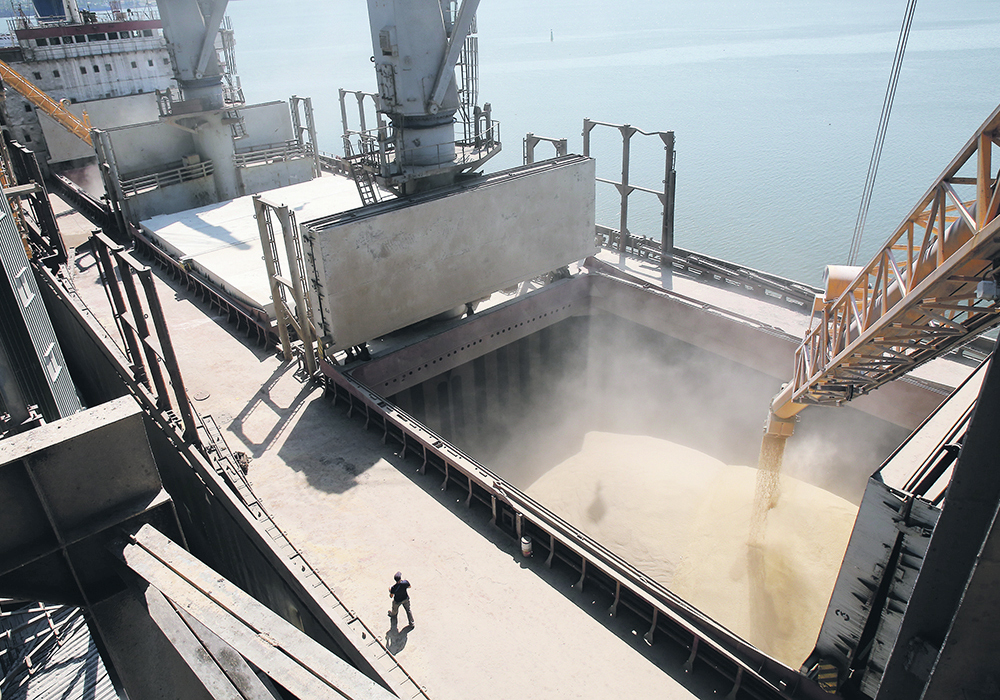Canadian grain is heading to markets at a record-breaking pace but is there a point where the COVID-19 buying frenzy subsides, causing a lull in sales?
Grain companies exported 12.2 million tonnes of bulk grain, oilseeds and pulses through week 12 of the 2020-21 crop year, a 29 percent increase over the same time last year.
The record sales pace is attributed to increased demand resulting from the global pandemic as countries around the world scramble to address food security concerns in a world of lockdowns and travel restrictions.
Read Also

Farming Smarter receives financial boost from Alberta government for potato research
Farming Smarter near Lethbridge got a boost to its research equipment, thanks to the Alberta government’s increase in funding for research associations.
Chris Dekker, president of the Saskatchewan Trade and Export Partnership, said the province’s booming agricultural sales are “no small miracle” given all the challenges of navigating a global pandemic.
Saskatchewan’s canola exports are up 37 percent in the first eight months of 2020 versus the same period a year ago, wheat shipments jumped 14 percent and lentils a whopping 107 percent.
That is a phenomenal performance but the nagging question on his mind is how will this prolonged sales surge impact long-term demand for the province’s agricultural commodities?
What happens when the stockpiling stops?
“If they’re using that supply, we should be fine,” said Dekker.
“If they’re storing or hoarding, there could be some minor impacts in the next few months.”
Neil Townsend, chief market analyst with FarmLink Marketing Solutions, thinks it is more of the former than the latter.
He said the big story in 2020 is the overwhelming demand out of China for a variety of Canadian crops including yellow peas, soybeans, canola, barley and wheat.
“Something is going on in China,” he said.
“They do not have the stocks that they claim they have.”
He wonders if the extensive summer flooding in southern and central China caused more crop damage than the government is letting on. A series of typhoons didn’t help.
Corn prices are at record levels in China, another strong indication that something is wrong with this year’s crop.
“You don’t get any sense from people on the ground there that it’s a stockpiling situation,” said Townsend.
“Stuff is arriving and it is being used.”
MarketsFarm analyst Bruce Burnett agrees. He said China’s economy is rapidly recovering from COVID and that is spurring demand. So is the rebound from African swine fever in the hog sector.
“If it is being fed to hogs, they tend not to store grain,” he said with a laugh.
There is strong canola demand from the European Union’s biodiesel sector due to poor EU rapeseed production. Again, the canola isn’t being stockpiled.
Pulse crops are flying out the door due to rising global consumption of protein meal and as a means to control food price inflation in developing countries.
“If you’re trying to curb food inflation, you generally import it and push it into the local market very quickly,” said Burnett.
Townsend said pulses have been included in government food aid baskets in markets like India during the COVID lockdown. Those pulses will almost certainly have been consumed by the poor families that received the baskets.
Sylvain Charlebois, director of the Agri-Food Analytics Lab at Dalhousie University, doesn’t see any slowdown in demand on the horizon.
“I’ve been involved with a few task forces on global trade and frankly the information we’re getting is actually quite reassuring,” he said.
“There’s nothing that I’ve seen that would be a source of concern.”
Townsend said there could be a looming lull in demand for certain commodities, such as durum, due to something he calls “pantry preparedness.”
Lots of households stockpiled pasta during the initial lockdown period and may not need to buy any for a while.
However, COVID is not going away anytime soon and the longer it persists the less risk there is that demand will subside. Many people around the world have lost their jobs and will now be consuming those stockpiled pantry items.


















